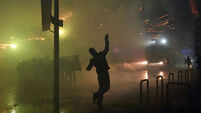Sri Lanka confident tsunami will help peace efforts
Sri Lanka is confident that co-operation with Tamil Tigers in tsunami relief efforts will strengthen attempts to end the country’s two-decade civil war, officials said today. But European peace monitors reported continued tension between the parties.
Jayantha Dhanapala, head of the government’s peace body, said contact with the rebels since the December 26 disaster, “has created a better atmosphere for co-ordinating tsunami relief and rehabilitation”.













